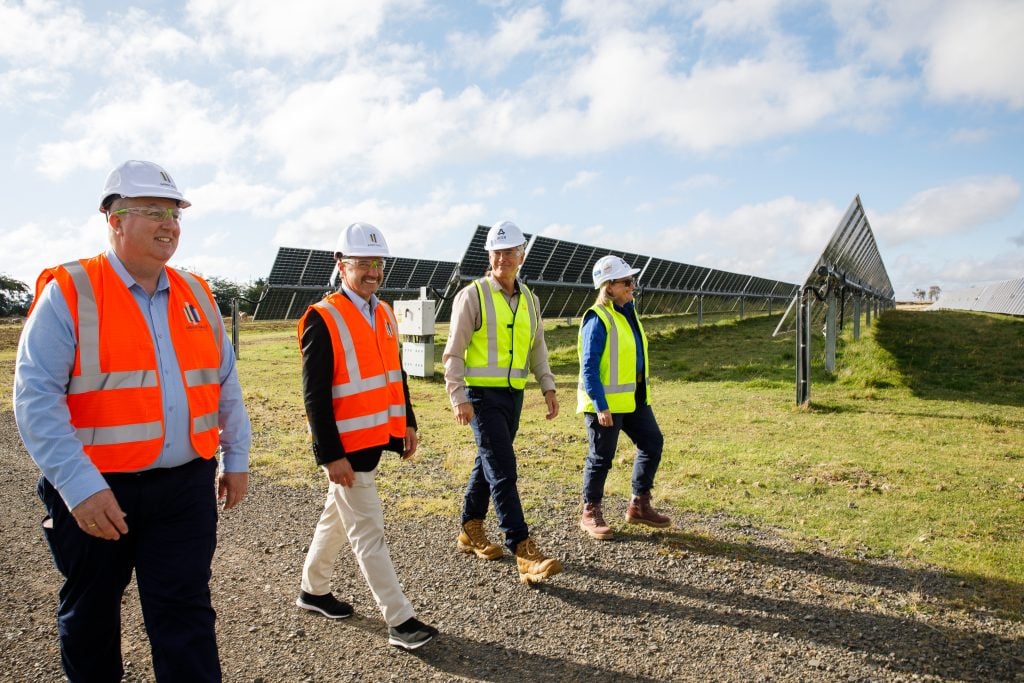
Renewable energy developer Acen Australia has started construction on a 200MW/400MWh battery energy storage system (BESS) co-located at the 720MW New England site in New South Wales, Australia.
The BESS, supplied by energy storage technology provider Energy Vault, will integrate advanced grid-forming inverters to provide system strength, stability, and network security services.
Enjoy 12 months of exclusive analysis
- Regular insight and analysis of the industry’s biggest developments
- In-depth interviews with the industry’s leading figures
- Annual digital subscription to the PV Tech Power journal
- Discounts on Solar Media’s portfolio of events, in-person and virtual
Acen said an expanded switching yard is required to connect the BESS and second stage of the solar project to Transgrid’s transmission network. Operation on the New England solar PV power plant started in March 2023.
The solar PV plant is divided into two stages. The first stage features a 400MW PV plant and is currently operational; the second stage will add a further 320MW, with this expected to come online in 2026. This project supplies energy to Japanese-owned drinks company Asahi Beverages and not-for-profit care company BaptistCare via a power purchase agreement inked in July 2024.
Acen confirmed that the 400MWh BESS will be co-located on the first stage of the New England solar PV plant. Acen has approval for a total of 1,400MW/2,800MWh of energy storage for the project.
Lumea, the commercial arm of Australian transmission system operator Transgrid, is conducting the BESS connection. The final commissioning is expected to take place by mid-2026. It is worth noting that Lumea is also conducting grid works for the 1.6GWh Melbourne Renewable Energy Hub BESS in Victoria.
First from NSW’s Emerging Energy Program
Acen noted that the BESS is the first large-scale battery project to begin construction with the support of the New South Wales (NSW) government’s Emerging Energy Program. This programme provides grant funding to assist with the development of large-scale electricity and storage projects.
There are two funding streams to support activities that accelerate the development of on-demand electricity projects. First is Capital Projects, recognised as activities that will assist with the construction of a dispatchable electricity project.
The second is Pre-Investment Studies which includes activities that will lead to the development of a dispatchable electricity project.
Energy Vault CEO and chairman Robert Picon said the New England BESS marks a great milestone for the National Electricity Market (NEM) in Australia.
“Our geotechnical and design work is almost complete and work to install the electrical infrastructure to connect the battery is well underway. We expect the civil and base electrical work for the BESS to begin over the next month or two, ready for the delivery of the battery modules in second half of the year,” Picon said.
Acen pursues second solar-plus-storage site in New England
The project is located within the New England Renewable Energy Zone (REZ) and near another solar-plus-storage proposal the developer is pursuing. The proposed 320MW Deeargee solar PV power plant will be located 12km southeast of the township of Uralla and around 5km south of the New England site.
It will feature a BESS with ‘a capacity of up to 1,400MWac two-hour energy storage, which may be configured as 700 MW four‑hour energy storage,’ Acen wrote in its Environment Protection and Biodiversity Conservation (EPBC) Act application.
The proposed project will cover 1,544 hectares of land currently categorised as predominantly freehold. Acen confirmed it has entered into agreements with the landholders for the site.






